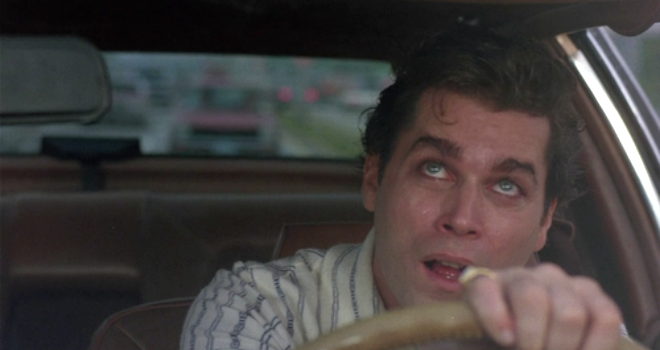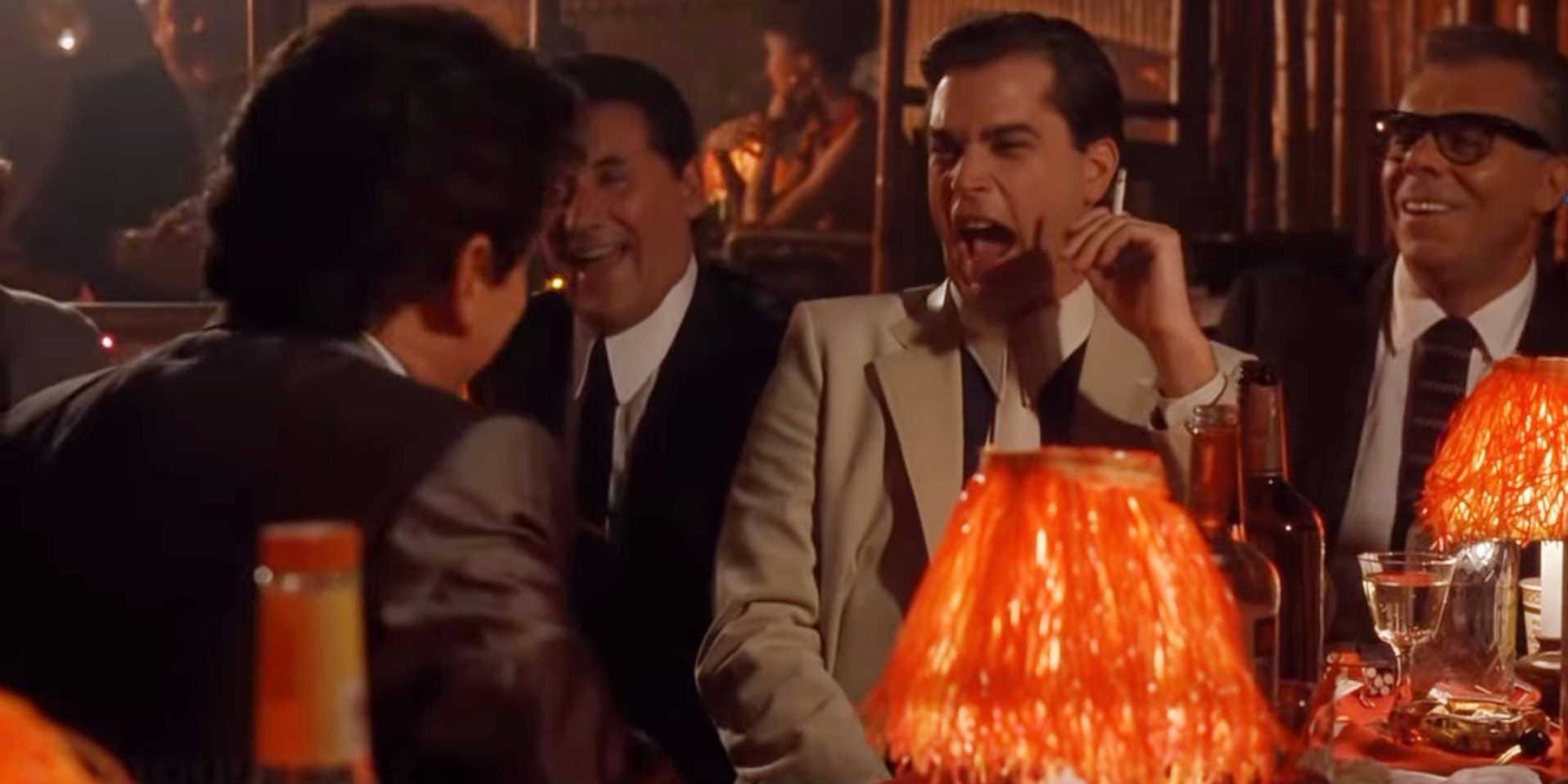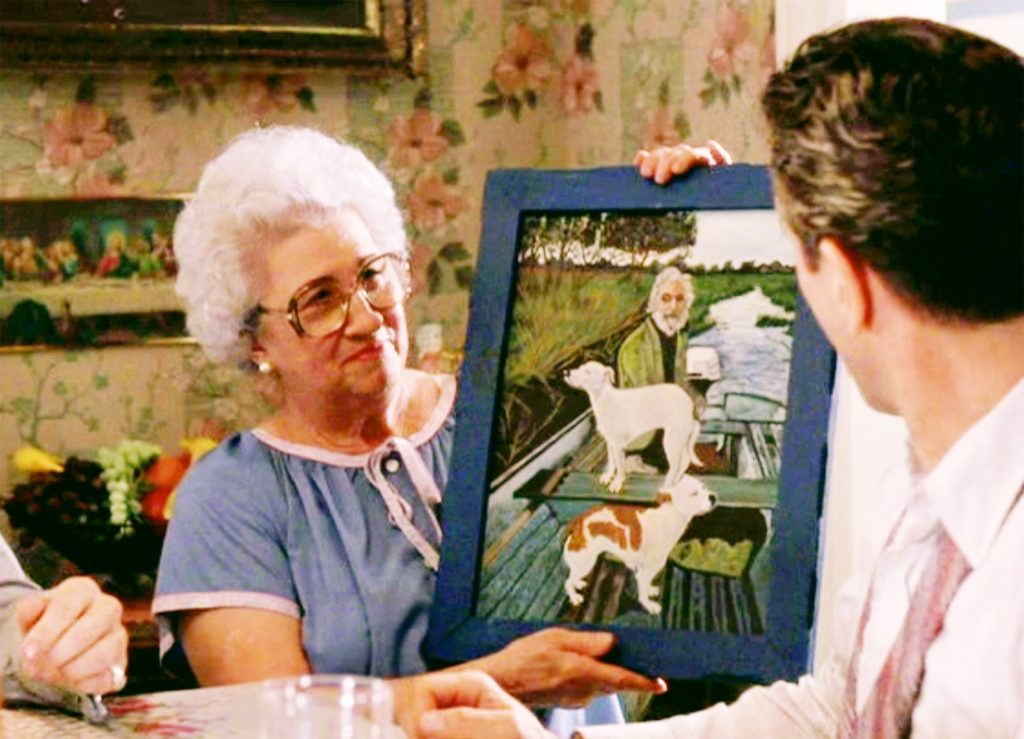God, this feels good.
Jesus, this feels terrible.
I don’t want to be doing this.
Why am I doing this?
This is the purest euphoria imaginable.
This is the deepest despair knowable.
I hate it.
I want to do it again.
Question: are these the manic, addled thoughts of a person on cocaine or a person watching Goodfellas?
Answer: doesn’t really matter, because they are one and the same.
Goodfellas is movie coke, the purest shit ever put on film: uncut and never stepped on; fiendishly, unbearably pleasurable; nihilistic and soul-abusing. It’s been getting us high for 30 years and it never runs out.

You get hooked on it.
You (I) (but probably you, too) go around quoting it for eh, your entire life, give or take.
The older and more delicate your sensibilities grow, the more deeply it offends them. Appalls them, really.
And yet you continue to get off on it, finding your still-boyish ego no less in thrall to its kinetic brutality. You are an addict and loathe yourself for it.
You tap ‘Play’ on your iPad’s touchscreen, noting–casually, flippantly–the profound technological advancement of your era. Because, as addicts do, you’re really thinking back to that first hit–delivered in the manner of most 90’s childhood cultural contraband, via premium cable.
You can still see the look on DeNiro’s then-young (but still so old) face: detached, workmanlike and yet so clearly, horribly sadistic as he kicked the life out of Billy Batts on the floor of the Suite Lounge.

Your stomach gently churns, mixing up that old cocktail of revulsion, fear (actual fear!) and stimulation.
Pure, total, nearly unbearable stimulation.
You look down at the time stamp. 148 minutes to go. It doesn’t matter. You’re already living the third act.
This is the bad time.

Okay, let me just say right here: Scorsese knew exactly what the fuck he was doing.
We know this. This shouldn’t bear saying. But it does, due to a resilient strain of bad take that tends to circulate in places where annoying men of a certain age gather (i.e. Twitter, i.e. podcasts, i.e. this website?).
The take basically goes like this: “Scorsese’s crime movies (for which Goodfellas is a metonym) do not glorify a life of crime because the protagonists all end up alone and miserable in the end.”
This is a flimsy, disingenuous theory that relies on a willful ignorance of how storytelling in general and movie-making in particular work.
Put simply, we tend to identify with the protagonist of a story, be they criminal or saint. This is exponentially more likely when the story is told through a visual medium that relies on beautiful, charismatic performers.
Of course it makes it look fun. Goodfellas is pop art and it is a hit. A HIT. Like a 70’s AM radio hit. A monster. The kind that never dies. “Tiny Dancer.” “Hotel California.” And how many people honestly think of “Hotel California” as an anti-heroin song? You might say those people (should they exist) are…um, missing the point?

I think this take actually exists because it gives men of a certain age an out. We are, on some level, embarrassed–ashamed even–to still be so titillated by gangsters and guns. With our blogs and our MFA’s and our pithy way with 280 characters, we feel that we really should have grown out of it. We invent a moral high ground where we can sniff our movie coke in private and pretend we’re doing it in an intellectually valid, hipster, Sigmund Freud kind of way.
Which we are, buuuut…we’re also not.
We’re Henry Hill, baby.
We’re seeing helicopters, reminding our kid brother to stir the sauce, sweating through our polyester shirts.

This is the lasting legacy of a movie like Goodfellas–as in many of Scorsese’s best, it forces us to live our deepest fears of masculine inadequacy. Of inhabiting a world in which violence and brutality can be visited on you at any moment by forces fundamentally more powerful than you are. In other words, what it is to live in a human body on planet earth.
And he does it with such a mastery of pop filmmaking technique that one is also forced into a hard recalibration of one’s own sensibilities. Like when you’re driving alone and find yourself fully rocking out to “Tiny Dancer,” newly certain that not only do you like Elton John, he fucking rules.

You watch Goodfellas and you don’t just like Bobby Darin, he fucking rules. So does some country club putz getting his face bashed to a pulp in a driveway, so does Tommy’s mom and her painting, so does Jimmy garroting Morrie with a telephone cord, so does Morrie’s wig for that matter, so does Morrie’s Wigs for that matter, so does Spider telling Tommy to go fuck himself, so does Jimmy’s Dad-like frustration at Tommy’s act of cold-blooded murder (“You shoot the guy?!”), so do so many other moments, all 128 of them, in fact.
Movie cocaine.
It fucking rules so hard that it makes you want to jump out of your skin. You want give your soul a cleansing bath by the end of it.
I wrote about a similar experience rewatching The Sopranos last time. Maybe this is the difference 20 years of adulthood makes. You notice the bad stuff more, totter around a little older and slower, wondering where the light went.
I don’t know much about the nuts and bolts of filmmaking, but I know how movies make you feel. Like all pop masterpieces, Goodfellas pulls off the miracle of technical perfection that also evokes deep feeling. And–a further miracle, most of those feelings are complex. Good, bad, dark, light. It’s not a cautionary tale any more than it’s a hagiography. It is great art and therefore many things at once. Don’t believe anyone who tells you otherwise.
So, while we’re here, what is there to say about the actual movie?
Jesus, I don’t know.
What is there to say about “Tiny Dancer” or “Hotel California?” You really want to go down that long, nearly endless road?
I’ll share a few thoughts that have lingered with me after rewatching:
- The Lufthansa Heist is never explained, let alone shown! Never noticed that before. Arguably the most crucial (and most famous) plot point in the movie and the viewer essentially has no idea what it even is. The fact that we don’t notice and don’t care is significant.
- They maybe would have gotten away with it if Stacks (a young Sam Jackson nearly upstaged by his Gucci tighty-whiteys) hadn’t fallen asleep and left the truck outside his house?? Carbone could have avoided the meat locker?
- Ray Liotta is great. I had always thought of him as sort of a cipher, a blank upon which the more colorful characters of Tommy and Jimmy project themselves. Not so. He is a dynamic presence–sympathetic and sensitive, mercurial and menacing.
- The music. I know, I know. It’s been talked to death, but it’s hard not to notice it anew. It’s not just that the constant pop underscoring in the third act conjures the sensation of being coked-up, manic and paranoid (which it does)…it connects the viewer to the story in a way I hadn’t noticed before. Post-boom Americans were a radio generation. We grew up with music as an ambient presence in our lives, but one we were unable to personally curate, as the youth can today. Scorsese takes this welcome intrusion and uses it to creative ends. As with most of the aesthetic elements in a gangster film, it is commentary on itself: it’s all just entertainment, right? Style and fun? The music, the cars, the suits. Style and fun, until…it ain’t.
Or is it?




The music. He knows how and where to use songs. Harry Nilsson’s Jump Into the Fire, Donovan’s Atlantis, and the Stones Monkey Man were perfectly placed. When I hear those songs now I think of Goodfellas more than the artist who did them.
The movie is one of those perfect movies. I’ve watched it at least 6 or 7 times and I wouldn’t mind seeing it again.
LikeLiked by 1 person
Only 6 or 7? Amateur! Lol just kidding. I’m actually the amateur because I really never stopped to notice how the song choices match up with the story. Another rabbit hole to dive down!
LikeLiked by 1 person
I am an amateur lol…it’s a movie that never gets old.
LikeLiked by 1 person
That’s a wonderful take on one of my favourite movies, thanks! I think one of the reasons films like this are such a pleasure is that they offer a window into a part of our world where the social terms of the Norse saga or the Greek myth still hold true, where might and right are always aligned, and they enable us to enjoy it from a distance (it’s always going to be terrifying and humiliating in close-up…)
LikeLiked by 1 person
Nice to hear from you, Oli! Yeah, totally. Might makes right is so fun to imagine from a distance (and one might argue post WWII Americans are still recovering from a brief collective spell of believing that that myth was actually reality). Thanks for stopping by.
LikeLike
Good piece. I love Goodfellas too, for all the usual reasons, and I would add one other point as to why we identify with the characters (and it’s so obvious for this and for The Sopranos I hesitate to mention it): These are all lazy bums who don’t have to get a real job, pursue an honorable career, take the daily dollop of shit and they get rewards like regular guys only dream of
Where it ends up is another question, but what a vicarious thrill!
LikeLiked by 1 person
Yep! There is a scene in “A Bronx Tale” that kind of gets at this point. Where DeNiro tells his son, “Your father’s the real tough guy, the guy who goes to work every day and does what he’s supposed to to take care of his family” (or something thereabouts). Too bad workaday life doesn’t make for the vicarious thrills of gangsterdom!
LikeLike
Patrick,
Have you ever seen ‘Something Wild’? Ray Liotta could have made a career out of that one performance.
LikeLiked by 1 person
Have not seen much of it, just started it on Prime. Going to watch though, and looking out for that Liotta performance. Thanks for the tip!
LikeLike